The Outer Worlds
Developer: Obsidian Entertainment
Platforms: PC, Xbox One, PS4
Price: $59.99
Copy purchased by reviewer
October 25, 2019
From your first step onto Terra II, The Outer Worlds showcases exactly what it is: an rpg full of comedic tragedy, over the top sci-fi tropes, and colorful characters. It’s everything you’d expect from an Obsidian RPG. Comparisons to Fallout: New Vegas are apt but not totally accurate. While the two titles share fantastic writing, settings and gameplay options, The Outer Worlds builds on this foundation to create an enthralling experience with something new to discover or someone new to talk to with every planet skip.
Live Like A Spacer
Much like other Obsidian titles, your character is a nameless hunk of clay for you to craft into whatever character you wish. However, there is one caveat; they left earth for the Board-ruled colony of Halcyon upon the Hope, a colonizer ship filled with hundreds of thousands of other colonists. And that ship never showed up. Instead your character is unfrozen by a mad scientist that recruits you on a mission to unfreeze the rest of the ship’s cargo. It’s up to you whether or not that happens.
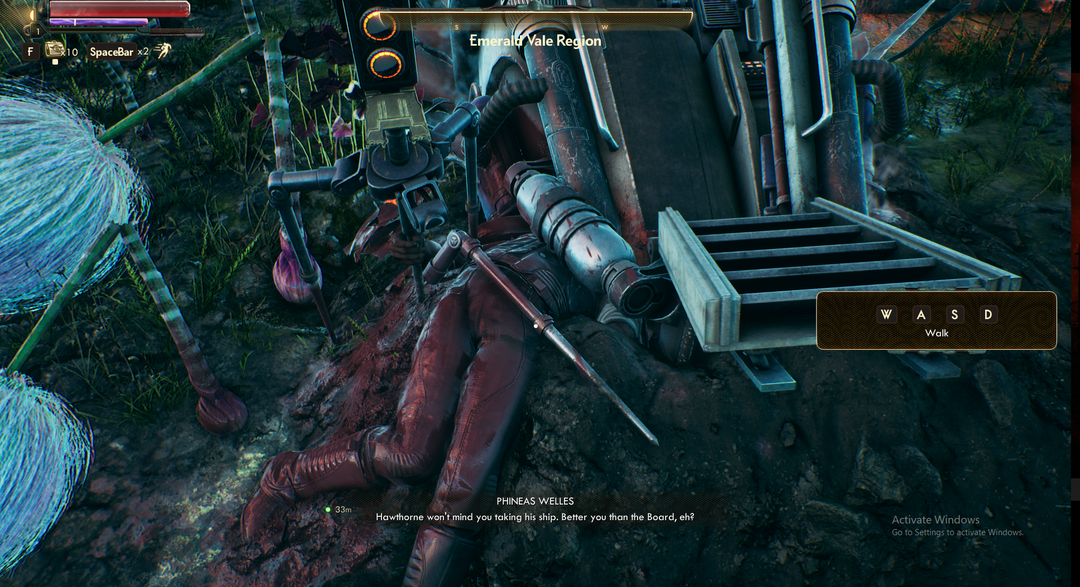
Thanks for the ship Hawthorne; I'll remember you as the man I landed on.
After being dropped onto the planet - and on top of the smuggler who was supposed to work with you - you’re free to do as you like. The first person you come across is an injured, hapless guard hiding out in a cave from bandits. I told him he was too stupid to use his weapons, he gave them to me, and then I shot him for being a dummy. That’s when I realized what kind of character I was playing as; a no nonsense space cowboy who has more than a little bit of a mean streak.
Of course, your character doesn’t have to shoot the dummy. You can just tell him he’s dumb and go on your merry way, leaving him to be rescued. Maybe you’ll see him again in the town of Edgewater. It’s your first stop through the mega-corporation funded towns of Halcyon, and it represents the feel of the game in its entirety. Edgewater is a, for lack of a better term, backwater town whose main product is canned saltuna. Saltuna is also mostly what the town lives off of, along with other products of their parent company, Spacer’s Choice.
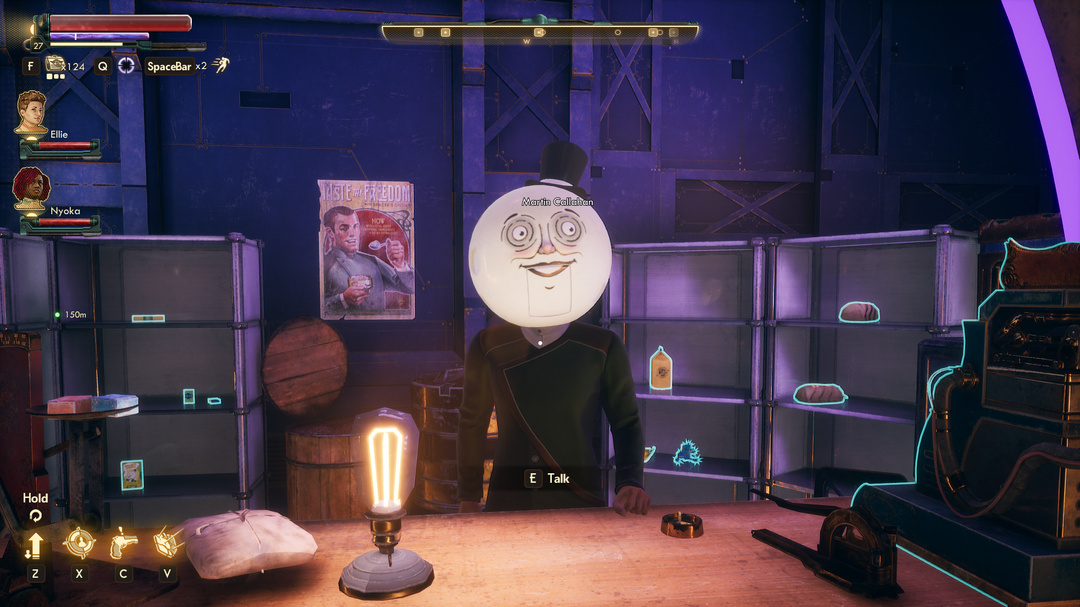
It's impossible nopt to feel bad for the guy stuck in that helmet.
If the picture I’m painting isn’t extremely clear, imagine mega-corporations in the wild west and you’ve pretty much got it. Oh, except the corporations own people. The Outer Worlds is delightfully tongue-in-cheek with its extensively dystopian view of a hyper-futuristic space colony ruled by a board of corporations. It’s capitalism on steroids to the extreme, and the game lets you know that early on. One of the first quests I encountered involved collecting fees on gravesites from Edgewater’s inhabitants. These permanent resting places aren’t owned by people, or free; they’re owned by Spacer’s Choice, and so people have to rent them. Let that concept sink in for a moment and then consider this: that’s the surface level of incomprehensibly terrible things that corporations do in this game. The Outer Worlds speaks volumes on the negatives of capitalism run amok while keeping its wacky tone in the forefront. While the game never really says anything directly profound, it doesn’t really have to to get its point across when the environments it paints tell the story on its own.
One of my absolute favorite things about Obsidian’s titles is their ability to reflect your decisions in the game world. One of my biggest gripes with Skyrim was that you would save the world from total destruction and nobody would recognize you; itt was just back to business as normal. That’s absolutely not the case in The Outer Worlds. Every decision you make, whether it’s made in a side quest or a main quest, has a visual effect on the world. The first major decision that you’ll make in the game regards the fate of Edgewater, and when you leave the small town it’ll be for better or for worse, and you’ll see the difference. Consequences are real, and the developers understand how important that is for gamers to see.
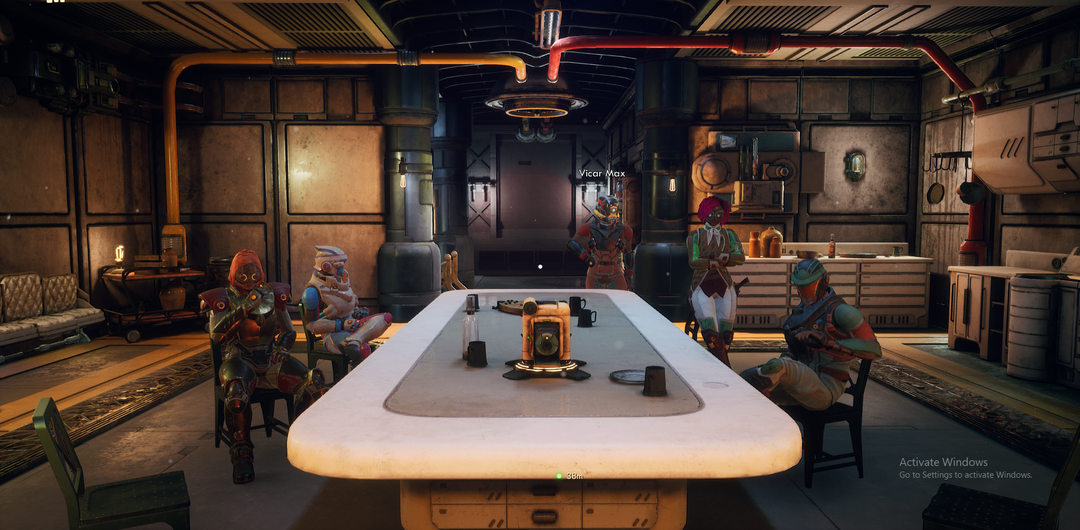
Your crew are the backbone of your ship, as well as your best friends.
Depending on how things end in Edgewater, you’ll board your ship, the Unreliable, with two radically different companions. Max, a vicar with a roaring temper, and Pavarti, an angel that must be protected at all costs. You may have noticed a difference in those two descriptions, the latter being more of an opinion rather than an observation. Well it’s not an opinion, it’s a fact. She’s absolutely perfect. Each character is written and designed to build a relationship with the player; and while you may not like some of them the first time you meet, the more time you spend with them the more humanized they are. Max for instance is, like I said, a hothead. He’s also a flat out jerk, arrogant in his beliefs and lauding over the peasants from his ever-high horse. But the longer you journey with him and the more he reveals about himself and his past, the more you understand his anger and frustration. Like the other companions, this culminates with a personal quest in which you get to decide this character’s fate. There’s no part of The Outer Worlds that you don’t play a role in.
Also if you don’t like someone that much you can just tell them to pack their things and get the hell off your ship. Just in case.
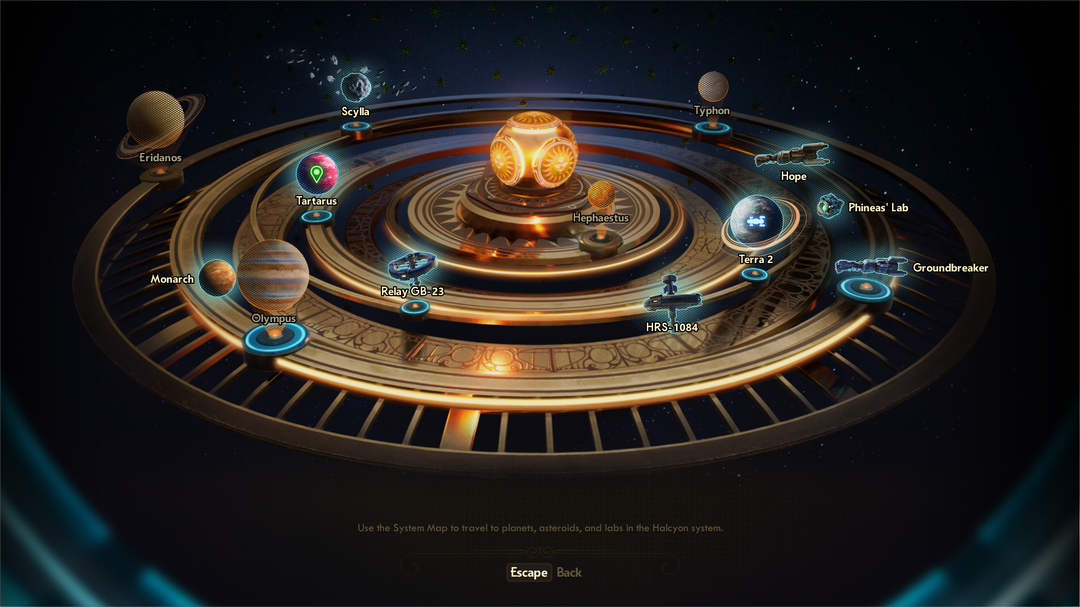
This game whisks you away to various worlds, each with their own unique characters, environments and problems. How you navigate through these is your choice, which can seem daunting at first but soon comes like second nature. The longer you play your character and find a playstyle that fits for you, the easier it becomes to approach any new situation. The more you figure out who your character is; an anti-corporate outlaw or a mercenary working for whoever puts up the most cash, the easier it is to make decisions. I’ve never felt more free in a game than I have travelling through Halcyon on the Unreliable.
More Variety Than The Board Offers
The freedom in choice that you have in the story of The Outer Worlds matches the freedom you have in approaching the rest of the game. Any playstyle is possible - you can wield a pulse hammer, blast enemies with a plasma rifle or rock a good old fashioned revolver. Unfortunately as the game progresses, all of these options can become a bit of a drag. Even with the variety of ways to approach combat, it remains the least satisfying part of the game. In the early game, fights are decisive, you’re either beat or you just barely win. Coupled with the game’s Tactical Time Dilation (TTD for short), which slows time to a crawl and affords you the opportunity to scan targets for weak spots and shoot them to impose negative status effects, these fights are the most exciting of the game. However, by the third planet I found myself dreading getting into a gunfight with one of the dozens of bandit groups scattered on the planet. I almost wished I had put more points into stealth so I could just sneak past them and get to my next objective.
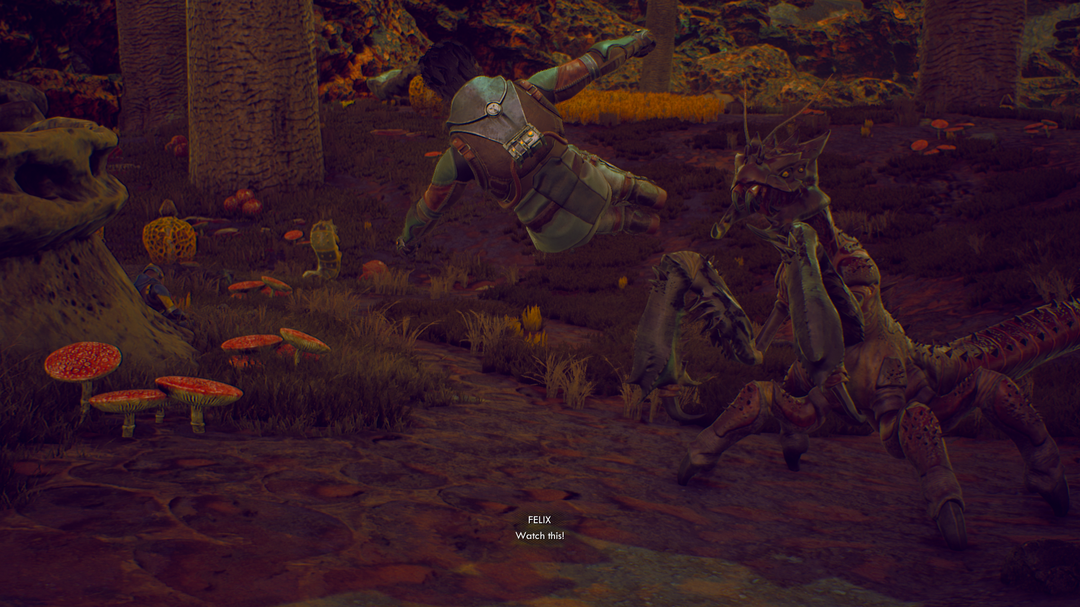
Companions also have their own abilities. Felix’s is a dropkick.
Eventually I could down basic enemies with one good headshot, making combat in the open a breeze, and that was mostly due to my character’s build. The Outer Worlds’ unique approach to skill points and perks are what make building a character so much fun. There’s enough space to be great at a number of things while being terrible only at a handful. For example, my character had silver-tongue and hung a long rifle on her back. She could pick a lock or fix a scrape, but ask her to hack a terminal or fix some tech and she was useless. Perks played a huge part of this customization too, along with the flaw system. To make characters feel more unique and build more of a story around them, players can pick a flaw if it pops up. Maybe you fell from a height and hurt your legs, you can choose to have a fear of heights in exchange for another perk point. Sure your character will have less dexterity when the ground is far beneath them, but that’s never ended badly.
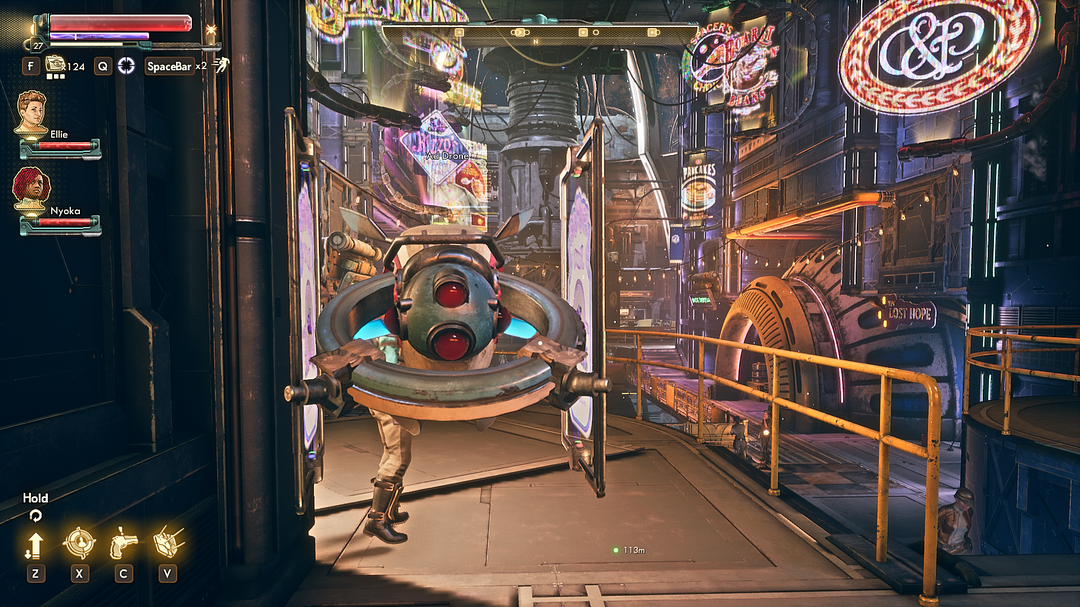
My character was afraid of auto-mechanicals, including even this lil' guy in town.
Of course if your character is this customizable, so is the gear that they use. There’s tons of armor and weapons to choose from, each with their own advantages and disadvantages. The universals between the two are their support for mods and upgrades, and deterioration. Most of the gear you pick up can be altered in one way or another, and make some pretty wacky possibilities available, like machine guns that spit electrically charged bullets, or flamethrowers that spew plasma. And when you outlevel your favorite gun, you can tinker with it to upgrade its base damage. You’ll definitely find better weapons and armor over the course of the game, but if you’ve got a weapon you love you don’t have to part with it. You have to keep it in good condition, but that’s hardly a challenge. Weapons and armor are repaired with their respective parts, which can be found scattered across the world and obtained from breaking down gear. While degrading conditions aren’t my favorite part of the game, they were never enough of a hassle to get annoyed at.
Speaking of things you’ll have too much of: consumables. Like every rpg, this one has its own kind of potions. They’re consumables made by every brand of the board, and there’s plenty to choose from. We’re talking sodas, booze, inhalants, injectables, coffee and cigarettes... you name it and chances are two companies have their own versions. While this is a great reflection of the game’s setting, it’s overwhelming for a player at the least. There’s far too many consumables to remember what is worth picking up and what isn’t, and if you end up picking up everything, you’ll have a list two pages long. You can store the worthwhile items in your inhaler for instant use, but looking out for those items is a challenge since you have to find them among the rest.
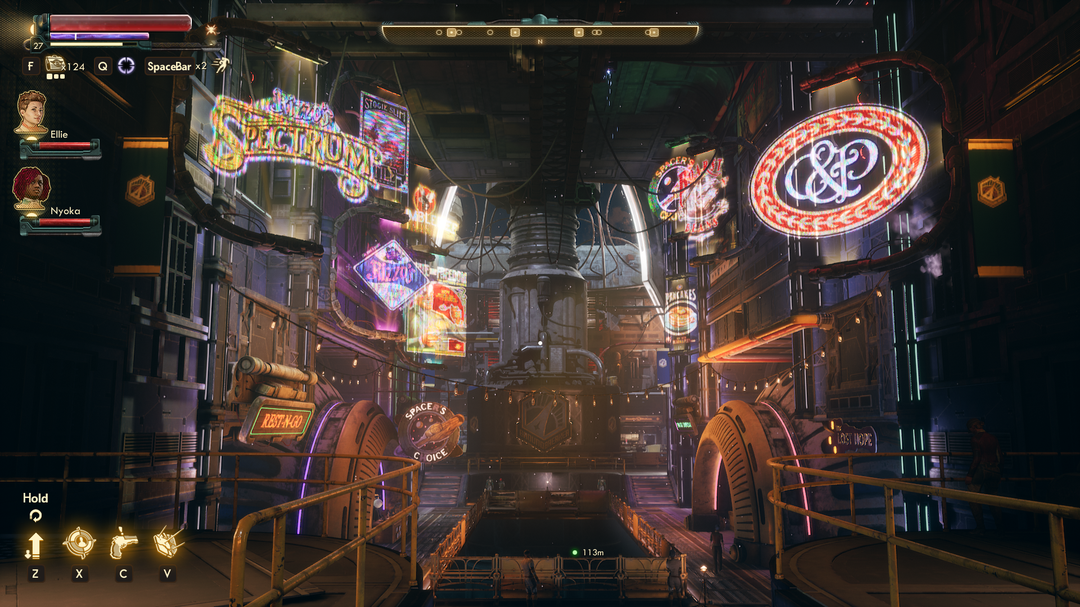
So many brands, not enough inventory space.
Truth be told, The Outer Worlds doesn’t feel like a game designed with combat and gunplay in mind. It doesn’t feel like something you should play if you’re looking for a good shooter. It’s so well written and driven by its characters that to play it without some kind of interest in the worlds you’re exploring and the people you meet would be a waste of time. While I did find that the game was lacking in so much that others have succeeded in, it excels far past the competition in other areas.
See You Later Space Cowboy
There’s still a lot that I have to say about The Outer Worlds. I want to talk about its anti-capitalistic notions, its zeal for corny sci-fi. I want to talk about how great of a companion Parvati is and what makes her so fantastic. But I can’t do that. The Outer Worlds isn’t just about freeing the colonists you came to Halcyon with. It’s about exploration and leaving your mark somewhere you’ve never been. Your character is a force of change, and to tell you how you could change everything or what that everything is would be a disservice to you, the reader.
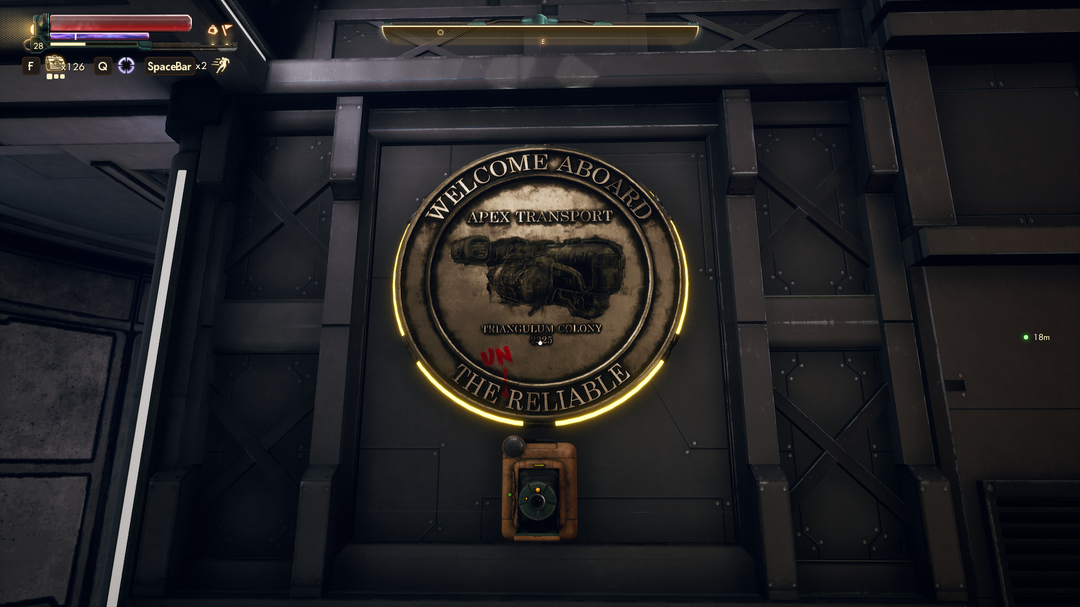
The Unreliable carries some of the best adventures in an RPG that I've had in a long time.
What I can tell you so far along in my journeys is this: The Outer Worlds is a return to form for role playing games. It lets you fulfill any fantasy you want to explore and has already planned for it. Any way that you play it, even if you’re a barbarian set out to kill everything that moves, it will charm you with its imagination of a futuristic colony on the border of civilization and the people that inhabit it. The Outer Worlds is a gift to those looking for a new RPG story to fill their time, and I intend to make use of it; you should too.